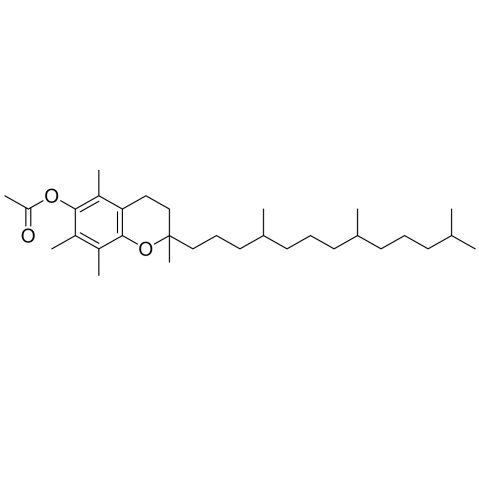Alpha-tocopheryl acetate, commonly referred to as vitamin E acetate, is a synthetic, fat-soluble antioxidant widely used in supplements, foods, and cosmetic products. It is an ester formed from acetic acid and tocopherol, created to provide greater stability and a longer shelf life compared to tocopherol alone. Once absorbed, it is converted into alpha-tocopherol in the body and skin, where it functions as an antioxidant to protect cells from harmful free radicals.
BRAND NAMES
Aquasol E is a brand of vitamin E commonly available in liquid drops or oral capsules. Infuvite is a brand that contains alpha-tocopherol acetate and is used to treat vitamin deficiencies, often included in multivitamin infusion products. Ephynal is another brand name for alpha-tocopherol acetate, as is Erevit.
MECHANISM OF ACTION
Alpha-tocopheryl acetate is a chemically stable prodrug that is hydrolyzed in vivo to release the active antioxidant, alpha-tocopherol. This two-step mechanism is the basis for all its biological effects. Alpha-tocopheryl acetate works by converting into its active form, alpha-tocopherol, which serves as a powerful antioxidant that neutralizes free radicals to protect cells from damage. This active form incorporates into cell membranes, where it donates hydrogen atoms to stabilize free radicals. Furthermore, it exhibits anti-inflammatory effects by suppressing inflammatory cytokines and is commonly used in skincare products because it is more stable than the unesterified form of vitamin E.
PHARMACOKINETICS:
Absorption
Alpha-tocopheryl acetate, a widely used form of vitamin E in supplements and fortified foods, is absorbed through hydrolysis in the small intestine, which releases free alpha-tocopherol. Its absorption largely depends on the presence of dietary fats and the individual's capacity to digest and absorb lipids.
Distribution
After being hydrolyzed into alpha-tocopherol in the small intestine, alpha-tocopheryl acetate is distributed throughout the digestive system. It is then incorporated into chylomicrons, released into the lymphatic system, and eventually enters the bloodstream.
Metabolism
Alpha-tocopheryl acetate is a synthetic form of vitamin E that is metabolized in the body to its active antioxidant form, alpha-tocopherol. The acetate group is added to the tocopherol molecule to protect its fragile hydroxyl group, making it more stable and extending its shelf life for use in supplements, foods, and cosmetic products.
Excretion
Following ingestion, alpha-tocopheryl acetate is broken down and metabolized in the liver, with most of it being excreted via bile and feces. The excretion process is carefully regulated, and consuming excessive amounts of vitamin E can result in a higher elimination of metabolites through both bile and urine.
PHARMACODYNAMICS
The pharmacodynamics of alpha-tocopheryl acetate, a synthetic form of vitamin E, involve its conversion to the active antioxidant alpha-tocopherol after absorption. This active form protects cells from free radical damage and has been found to inhibit protein kinase C activity, reduce the expression of adhesion molecules such as ICAM-1 and VCAM-1, and increase prostacyclin production, which benefits vascular health. Additionally, it helps shield the skin from UV damage and protects low-density lipoprotein (LDL) from oxidative damage.
ADMINISTRATION
Alpha-tocopheryl acetate, commonly referred to as vitamin E acetate, can be delivered orally, topically, or through injection. The choice of administration method depends on the condition being treated and the individual patient's health requirements. It is important to consult a doctor before starting supplementation, especially at high doses, to ensure the proper dosage and method of administration.
DOSAGE AND STRENGTH
Before considering the dosage and strength of Alpha-tocopheryl acetate, also known as vitamin E acetate, please remember that information is for general knowledge and should not be taken as medical advice. Consult with a healthcare provider for personalized guidance regarding supplements. Alpha-tocopheryl acetate is a form of vitamin E found in supplements and cosmetic products.
DRUG INTERACTIONS
Alpha-tocopheryl acetate (vitamin E) may interact with various medications, particularly by increasing the risk of bleeding when taken alongside blood thinners such as warfarin or aspirin. In high doses, it can also diminish the effectiveness of certain statins and niacin-based therapies, and may interfere with chemotherapy drugs like tamoxifen. For individuals taking more than 400 IU per day, it is essential to consult a healthcare professional to monitor and manage potential drug interactions.
FOOD INTERACTIONS
Alpha-tocopheryl acetate, a form of vitamin E, is most effectively absorbed when consumed with foods that contain fat. However, certain supplements and foods—especially those high in iron or with anticoagulant effects—may interfere with its absorption or elevate the risk of bleeding.
CONTRAINDICATIONS
Alpha-tocopheryl acetate, a form of vitamin E, should not be taken by people with certain medical conditions, especially when using high-dose supplements. It is also contraindicated with several medications due to an increased risk of bleeding. For inhaled forms, such as those found in vaping products, it is linked to severe lung injury.
SIDE EFFECTS
Gastrointestinal issues:
Nausea
Diarrhea
Abdominal cramps
Indigestion or bloating
Neurological symptoms:
Headache
Fatigue
Dizziness
Blurred vision
Skin reactions (mostly with topical use):
Rash
Itching or irritation
Redness or peeling
OVER DOSE
Overdosing on alpha-tocopheryl acetate, a synthetic form of vitamin E, can cause serious side effects, primarily due to its blood-thinning properties. While rare from food sources, toxicity is a risk when taking high-dose supplements. The safe upper intake limit for adults from supplements is 1,000 mg per day.
TOXICITY
Alpha-tocopheryl acetate, also known as vitamin E acetate, is generally considered safe for oral and topical use at appropriate levels but becomes toxic when inhaled or consumed in excessively high doses. The most severe and lethal toxicity associated with alpha-tocopheryl acetate occurred during the 2019 EVALI (e-cigarette or vaping product use-associated lung injury) outbreak.

